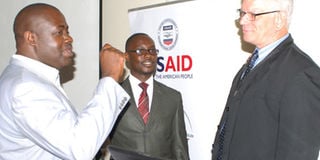Poll on Uganda sparks praises and protests

Lead researcher Prof Robert Matte (R) chats with IRI technical adviser Joseph Munyangabo (C) and NRM policy analyst Hippo Twebaze after the release of the opinion poll results at the Kampala Serena Hotel, on Friday. PHOTO BY joseph Kiggundu
What you need to know:
Disagreed. Most Opposition leaders disagreed with the poll findings, especially that majority of Ugandans are happy with government.
Kampala.
Opposition leaders and the government yesterday gave mixed reactions to an opinion poll by an American firm that showed majority Ugandans are generally satisfied with current government’s performance.
According to the poll conducted by the International Republican Institute (IRI), a US-based firm in cooperation with local firm Hatchile Consult, at least 69 per cent of 2,402 respondents in the survey said Uganda is headed in the right direction when asked about the overall direction of the country.
Opposition politicians from Forum for Democratic Change (FDC), Conservative Party (CP), Uganda Peoples Congress (UPC), People’s Progressive Party (PPP), Democratic Party (DP) and the Uganda Federal Alliance (UFA) immediately questioned the findings shortly after Prof Robert Mattes from the University of Cape Town, who led the research team, presented the findings at Kampala Serena Hotel, on Thursday.
DP Secretary General Mathias Nsubuga said: “I am very much disappointed in the findings of the study, given that researchers came to the conclusion well knowing that NRM is fused with the State.”
DP spokesperson Kenneth Kakande said the research was not revealing anything new to Ugandans.
However, government spokesman Ofwono Opondo dismissed the Opposition views, saying he is not surprised by their reaction.
“An opinion poll, if done well, is a reflection of the general perception of the whole country. We have been telling the people that although it is slow, the country is taking the right direction,” he said, adding that “NRM does not go with opinion polls but we take them in consideration”.
UPC party spokesperson Okello Lucima said while he disagreed with some ways in which the research was conducted, the findings are important for political parties, especially in creating a discussion.
However, Prof Matte advised that political leaders and the civil society ought to take the findings serious. “It is not us saying the country is headed in the right direction but that is what the voters are saying and it ought to be taken seriously.”
Poll summary
Findings
Overall, two-thirds of respondents (69 per cent) say the country is headed in the right direction.
Most of the respondents (52 percent) thought their personal living conditions (48 per cent) and the national economy (41 per cent) have gotten better over the preceding 12 months.
Majority of Ugandans surveyed felt that overall, the government was performing well or very well in managing the economy, reducing crime and delivering basic services in terms of health, clean water, roads and education.
Government performance was rated lower on fighting corruption, whereby 69 per cent of respondents said the government was handling corruption badly.
Six-in-10 Ugandans polled said political parties are crucial to providing voters with choice, and 53 per cent said political parties represent real causes and interests.
While most of those surveyed say the 2011 elections were completely or mostly free and fair, only half of the respondents have confidence that the upcoming 2016 elections will be similarly free and fair.
One-in-two respondents worry that they may become a victim of political violence or intimidation in the upcoming 2016 elections. One-in-three voters are concerned that the announced results will not reflect the actual voting results.
One-in-four worry that their vote will not be counted or fairly reflected in the results.
One-in-five agree that powerful people can find out how you voted, even though there is supposed to be a secret ballot.
Two-thirds of all voters agreed that the president should serve a maximum of two terms in office, and that no one should be able to serve as President if they are older than 75 years of age. Additionally, by a large margin, people felt the composition of the Election Commission needs to be changed (70 per cent) and that the president should not be involved in the appointment of its members (64 per cent).
Methodology
The research survey was conducted by IRI in cooperation with local Ugandan polling firm Hatchile Consult, who conducted face-to-face interviews from December 4 – 23, 2014.
Respondents were a random, nationally representative sample of 2,402 Ugandans drawn from 12 regions across the country, aged 18 years and older. The margin of error for the entire study is plus or minus two per cent. In total 3,039 houses were visited to obtain 2,402 interviews.
Thus, the response rate for this survey was 79 per cent. This baseline survey is the first of two polls that IRI will conduct in Uganda to capture citizen views leading up to the 2016 elections.
The United States Agency for International Development (Usaid) funded poll is part of IRI’s five-year political competition and consensus building project.




